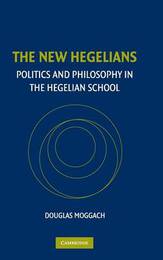
|
The New Hegelians: Politics and Philosophy in the Hegelian School
Hardback
Main Details
| Title |
The New Hegelians: Politics and Philosophy in the Hegelian School
|
| Authors and Contributors |
By (author) Douglas Moggach
|
| Physical Properties |
| Format:Hardback | | Pages:360 | | Dimensions(mm): Height 229,Width 152 |
|
| Category/Genre | Western philosophy - c 1600 to c 1900 |
|---|
| ISBN/Barcode |
9780521854979
|
| Classifications | Dewey:320.092243 |
|---|
| Audience | | Professional & Vocational | |
|---|
|
Publishing Details |
| Publisher |
Cambridge University Press
|
| Imprint |
Cambridge University Press
|
| Publication Date |
27 March 2006 |
| Publication Country |
United Kingdom
|
Description
The period leading up to the Revolutions of 1848 was a seminal moment in the history of political thought, demarcating the ideological currents and defining the problems of freedom and social cohesion which are among the key issues of modern politics. This 2006 anthology offers research on Hegel's followers in the 1830s and 1840s. With essays by philosophers, political scientists, and historians from Europe and North America, it pays special attention to questions of state power, the economy, poverty, and labour, as well as to ideas on freedom. The book examines the political and social thought of Eduard Gans, Ludwig Feuerbach, Max Stirner, Bruno and Edgar Bauer, the young Engels, and Marx. It places them in the context of Hegel's philosophy, the Enlightenment, Kant, the French Revolution, industrialization, and urban poverty. It also views Marx and Engels in relation to their contemporaries and interlocutors in the Hegelian school.
Author Biography
Douglas Moggach is professor of political science and philosophy at the University of Ottawa. A recipient of a Woodrow Wilson Fellowship and a senior research fellowship at King's College, Cambridge, he has held visiting professorships at the University of Toronto and the Scuola Normale Superiore di Pisa. He is the author of The Philosophy and Politics of Bruno Bauer.
Reviews'Richly informative and carefully edited ... This book is instructive in a way that the new Hegelians would be in a position to appreciate, not as a lesson of republicanism but as a provocation of thought.' Katerina Deligiorgi , Notre Dame Philosophical Reviews
|